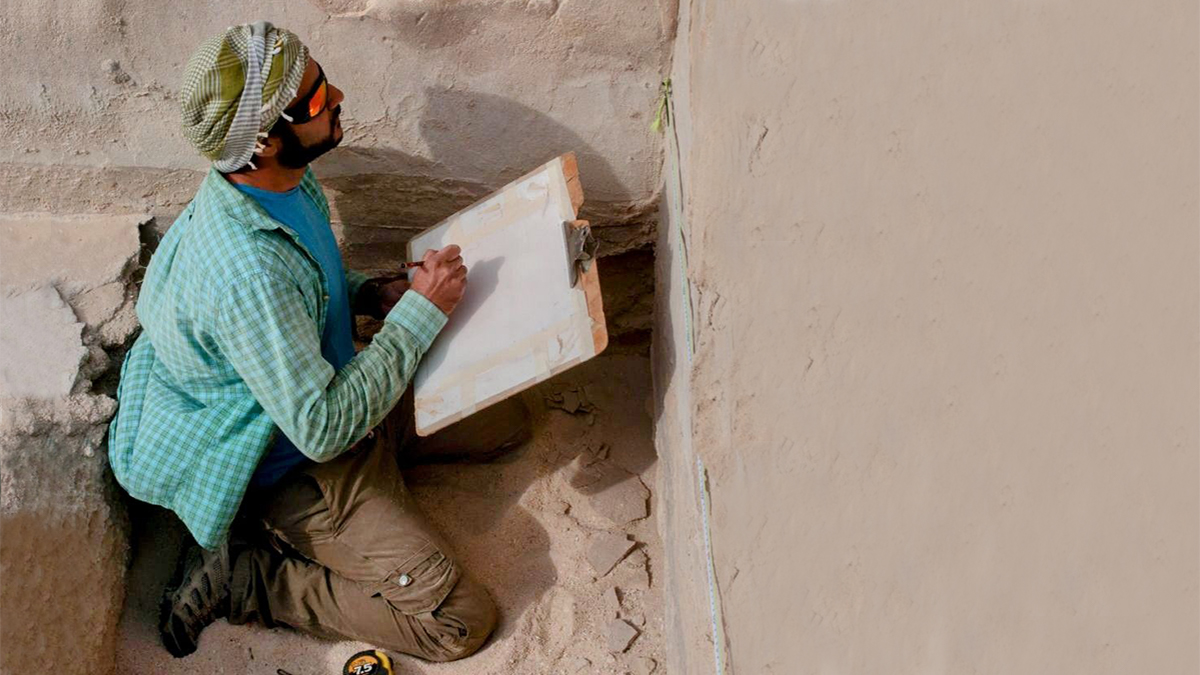Hands-on experience opportunities right from the start
The Department of Archaeology’s field school allows students to participate in excavations as early as their first year of study.
“For first-year students, I can't think of any other institution which would provide as many opportunities.
“When I went to Jordan, I was a new student, without any practical experience. Sleeping in the Bedouin tent was a bit of an Indiana Jones moment! The older students and the staff from Reading were so helpful and supportive. I was gladly thrown into the deep end with this fantastic excavation it was such a privilege and opportunity. Reading gave me the tools (literally!) that I needed to develop, and that first opportunity really spurred me on to apply for other experiences.”
Rizwan recommends that all new students “seize every opportunity” the University has to offer, especially the field school.
“There are so many great opportunities available at the University of Reading. Seizing them is the fundamental advice I would give every new student. It’s how we make such great progress – for myself, I grabbed every opportunity possible, and it was a wonderfully rewarding experience.
“I went from Jordan to the Department of Archaeology's training excavation which, at the time, was in the Roman town of Silchester. It is one of the best field schools that anyone could attend; hugely influential and helpful for one’s career and learning. From there, I went to Islay, where we were starting from scratch, discovering new areas to excavate. All three were fantastic, contrasting experiences.”
Rizwan explains how those first-year experiences led to finding further field work opportunities.
“In my second year, I joined an EU-funded heritage scheme in Finland. Next, I returned to Silchester, this time to help train the first year students. Here again, Reading’s approach is incredible. You are given this type of responsibility that feeds directly into career skills like leadership and mentorship.
“All my summers at University were spent in the field. In my second year, I went to an excavation in Palestine, which dates back around 60,000 years. That again broadened my horizons and the opportunity arose through my contacts at the University of Reading, which has a long association with such excavations.”
High level of support
Rizwan extolls the support he received from University staff, in particular Associate Professor Amanda Clark, who trains students in all aspects of field archaeology. She is Director of the Archaeology Field School.
“Amanda is a mentor to so many students, going above and beyond to encourage students to apply for every opportunity, demonstrating how important they are for one’s development. Amanda Clarke’s influence was instrumental in shaping my career and she epitomises the ethos of the staff at Reading.”
Building an international network
During his three years at Reading, Rizwan went on six excavations in different parts of the world meeting people from many countries and building an international network, which led to more invitations to excavate internationally, setting the foundation for his career.
“Once I graduated, I immediately went to work for the Museum of London, excavating the Temple of Mithras beneath the heart of modern London. We'd take four or five ladders down to reach the site and would be walking the streets of Roman London. It was amazing.
“After that, I worked with the British Museum's excavations in Sudan. It was very remote and each morning at the crack of dawn, we would get a boat to the site, sailing past crocodiles.
For a young person, it’s the dream. You travel the world – that is the nature of archaeology. Very few fields or roles give you such opportunity.”
Rizwan continued working in the field for a number of years, living out of a suitcase and hardly being at home. Then he ended up back in London, working for the British Museum as a curator.
“It was amazing and to add to the alluring magic, our office was reached by a secret door hidden in very tall bookcases in the Enlightenment gallery! My next move was to Barker Langham, where I enjoy a deeply interesting and fulfilling role today, working on the development of museums and exhibitions around the world.
“It's been a wonderful whirlwind of an experience and I am immensely grateful to the University of Reading for the opportunities and foundation it provided.”
Find out more about our undergraduate courses
